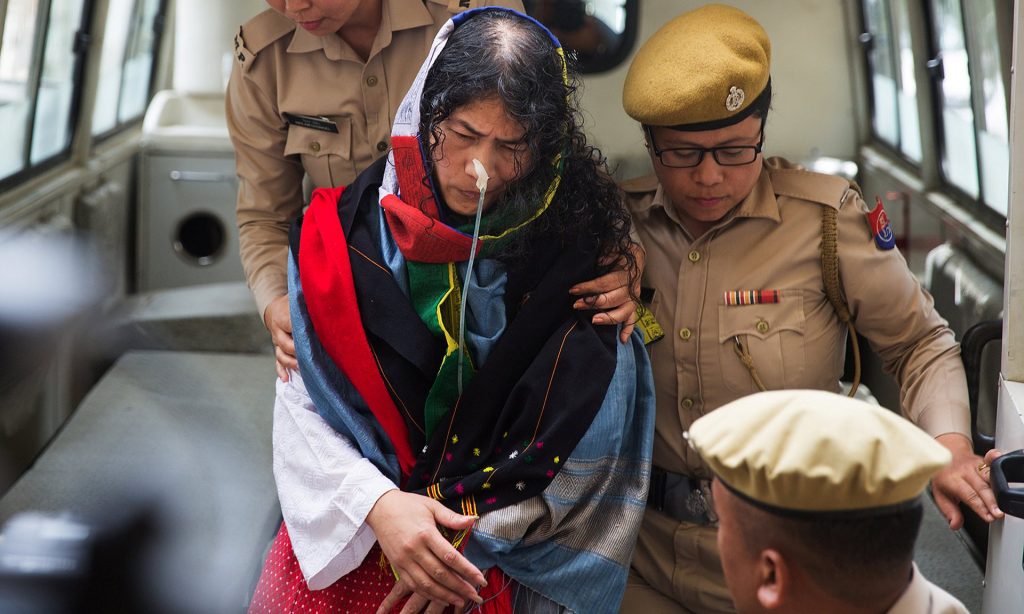After 16 years, it was a lick of honey that did it. The world’s longest hunger strike ended on Tuesday when an Indian human rights campaigner gave up her protest against state violence but pledged to continue the fight in the political arena.
Crinkling her face at the taste of food, Irom Sharmila, 44, from the troubled north-eastern state of Manipur, finished the fast she began in 2000 after the Malom massacre – when 10 people were reportedly killed by a government-run paramilitary group near the city of Imphal.
“I will never forget this moment,” said Sharmila, whose solo protest had become a symbol of Manipur’s resistance against state violence.
At the start, she vowed not to eat until the repeal of the Armed Forces Special Powers Act (AFSPA), which grants the military immunity from judicial scrutiny in disturbed areas. But years of fruitless struggle have driven her to try a different route.
Speaking to journalists on Tuesday, Sharmila said she wanted to topple Manipur’s incumbent chief minister, Okram Ibobi Singh, whom she accuses of presiding over years of insurgency and corruption.
“I’ve been the real embodiment of revolution,” she said. “I want to be chief minister now. I know nothing about politics and academia. My education is very, very low. Everything I have I will use for the positive, for society.”

Photograph: Reuters
Sitting on a plastic chair outside the Jawaharlal Nehru hospital, Sharmila burst into tears as she tasted honey for the first time in 16 years. During that time she had been fed only by drip while in police custody.
Doctors had told colleagues she would not survive for long without food or water. Now they fear that her body may struggle to cope, and have advised a liquid diet as she starts to eat and drink again.
Sharmila is charged with attempted suicide – a crime in India – and was granted bail on Tuesday afternoon by Judge L Tonsing at a court in Imphal after announcing her intention to break her hunger strike. In court, she refused to plead guilty to the charge, and insisted that she should be freed.
Some of her supporters have expressed anger at her decision to break her fast before her goal was reached.
Tokpam Somorendra, who lost his son Shantikumar, in the Malom massacre, said: “She has not fought for herself, or for someone she knows, but for all of us. She has fought our struggle. For me, she is next to God. But why did she take this decision so suddenly?”
Speaking to reporters at her hospital bedside, Sharmila said: “Let them kill me, the way they killed Mahatma Gandhi with their blood … People remain negative towards me, they want to think of me with the tube, without any desires, just as a symbol of resistance. This is my right to choice. I have the right to be seen as a human being.”
The end of her hunger strike coincides with the 70th anniversary of the Quit India movement, Gandhi’s non-violent resistance against British colonisers in India. This timing was interpreted by some as a shrewd political move from Sharmila that would highlight what many see as the betrayal of Gandhi’s vision for a free and democratic post-independence India.
AFSPA was passed by a Congress party government under India’s first prime minister, Jawaharlal Nehru, but has been used by successive governments to squash separatist movements in many states. Addressing the current prime minister directly, Sharmila said: “I want to tell Narendra Modi: Mr Prime Minister, you may indulge in your violence. But as a civilisation we need non-violence, we need an India without this draconian law.”
Political parties have already made approaches to Sharmila’s friends, but she has said she does not know which party she will join, or whether she will run as an independent candidate.
“She is above politics,” said Somorendra. “She has already achieved so much in the last 16 years. Military violence has gone down because of her and the awareness she has raised. For 16 years, people can’t object to anything she has stood for. If she joins politics, opposition will come.”
Amnesty International said: “Irom Sharmila’s decision to break her hunger strike gives India another chance to start a dialogue and recognise how the AFSPA has alienated Manipur for over 35 years.”

